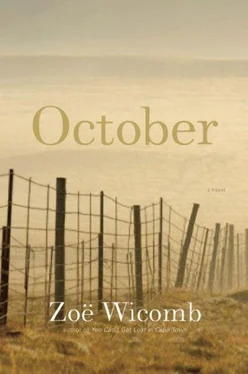Mercia mouthed her congratulations. She could only hope that fatherhood would keep Jake on the straight and narrow, though really, it seemed irresponsible, the casual way in which he took to reproduction.
Ag man, Jake conceded, we get along, the old man and I. And he’ll like being an oupa. Too old and decrepit he is now to think of whipping a child.
True, Nicholas was not well at all, but he brushed off Mercia’s anxious questions about his health. Yes, yes, he said impatiently, he’s seen the doctor. All he needs is his favorite chicken and barley soup that Nettie used to make. The old country convention of cooking the entire chicken leg, foot, claws and all, was repellent to Mercia, but no, he insisted that that was best. The strong flavor, he claimed, the medicine that would restore his health, was from the gelatinous stuff of the joints; he would eat nothing else. Mercia poured boiling water over the hideous claws and scraped off the yellow scales.
Her father, diminished, had a faraway look in his dimmed eyes, the old stentorian voice turned down. If he knew of Sylvie’s pregnancy, he chose not to speak of it. Instead he reminisced about Nettie, about how lovely it would be if Mercia would come again with him to see the old place, the mission station where Nettie grew up. Oh yes, he wittered, Nettie also loved a good chicken soup with specks of yellow chicken fat and bits of tomato, not too much tomato, mind, just a speck of red, a couple of spoonfuls to bring out the chicken flavor.
Really, Mercia would have to stop him. She would have to speak of the child before she left. She winced at the thought of a baby — bald, helpless, mewling, waving its arms and legs involuntarily, like seaweed in water; she could only hope that it truly was the case that old people liked having grandchildren.
She tested the waters. You’ll want to be well by the time the baby comes. Jake will need your help.
Yes, Nicholas said, without enthusiasm. I said I’d help with a house that his wife has an eye on. He was very ill, you know, with the drink. Perhaps a child will settle him. Nicholas shifted into the plaintive mode. I did my best, he started, and Mercia shut her ears — surely not the old litany about saving and sacrificing. Why don’t we talk about chicken soup, she said.
Mercia thought that the house would please Jake, demonstrate their father’s care for him. Sylvie was over the moon. Ooh, she crooned, patting her flat belly, how nice it will be for the baby to start somewhere decent, a nice little room with a real cot. I’ll paint it bright yellow, and with nice sunny curtains. . She looked up into Jake’s stony face. Or, what do you think, Jake? Don’t you like yellow?
Do what you like, he snapped.
Mercia intervened. That’s no way to talk to your wife, Jake, but he interrupted. Just keep out of it, okay; you know nothing. I don’t want the old man’s house, and I don’t know what’s got into Sylvie. She’ll take anything, sell herself for a pair of curtains.
Ag, Sylvie said, he’s trying to be the old bad Jake. Look, I’ve cooked a nice tomato bredie, and she proceeded to set the table for two.
But aren’t you going to eat with us? Mercia inquired.
Looks like she doesn’t want to, so let her be, Jake said. We’ve got a lot to talk about; you’ve been away so-o long, he accused. His voice had softened so that Mercia did not insist. She thanked the girl for the food, and watched her leave the room.
So how’s this Scotsman of yours doing? Jake asked. Is he giving you enough to eat? You’re so thin. Not skimping on the food is he? And he roared with laughter.
Mercia sighed. It’s not funny, Jake. And do try to remember that I work; I’m a senior lecturer and I don’t rely on anyone to feed me. Craig is my partner, not my father.
For all the sparring and Mercia’s exasperation, Jake became once again the exuberant brother of her youth, who made her laugh with his impersonations, his parodying of members of their family and of politicians. Was it really so long ago that they huddled together in a mealie field, where the sky above had shrunk into a narrow blue strip, the satin edge of a familiar blanket in which they wrapped up together, protected from the world of adults?
Mercia did not speak of the child, and neither did Jake. They ate and laughed and drank Sylvie’s homemade ginger beer until late that night. It was only as she snuggled under the easi-care sheets and heard the girl bustling about in the kitchen that she wondered about Sylvie. What had Sylvie been doing whilst they sat at the table? Where had she gone? Had she been waiting outside on the stoep for them to finish?
If Sylvie had any memories of Ma and Pappa, whom AntieMa so piously invoked, she would not encourage them to lodge with her. The house was already chockablock with the mustiness of old people, relieved only rarely when Ousie came home, and that did not last beyond the day of her arrival, when the mustiness engulfed her.
Ousie worked in Cape Town and people said that she wore red Cutex lipstick. Not that she would have dared come home with painted lips, oh no, AntieMa would never have allowed her to cross the threshold in such a state. The Sodom and Gomorrah ways had to be left behind, but the sisters did not mind Ousie’s wages as a nurse’s aide at Groote Schuur; in fact, they boasted about her neat check uniform and the white cap that was nothing like a servant’s. They said that Ousie was trying .
When Ousie arrived, always after New Year’s Day when the Cape Town drunks were nicely bandaged up or safely behind bars, she brought a whiff of the modern that drifted around her person like perfume, guided the eyes to her white peep-toe shoes and the op-art shift that stopped just on the knee. AntieMa thought that a final band of black added to the hem would not go amiss, and Ousie nodded dolefully. There was no avoiding the improvement.
For the child, Ousie also brought clothes, which AntieMa inspected for decency, and often there was a hem to be let down, an extra buttonhole to be made. Which at the age of eight Sylvie was already capable of doing herself. Oh yes, AntieMa said, a girl-child must know how to do such things. As a good wife and mother your stitching must be near invisible.
Why did Sylvie not find it odd that they called each other AntieMa, Nana and Ousie, the names that she, the child, called them by? But Sylvie did wonder why she should have to be a wife and mother when none of the sisters, her sisters, was. But were they her sisters? Had Ma, whom she no longer could remember and who, AntieMa said, was as sin-free as the pebble-white hills, also been her mother? Or was she Sylvie’s ouma?
Don’t keep yourself old-fashioned, AntieMa, the spokesperson for all three, would reply, by which she meant that the child should not be precocious. There were things that you did not ask your elders. Sylvie knew that she was being fobbed off. AntieMa said: Of course Ma was mother to all of us, but we three are also your mothers. You, Miss Cheeky, have lots of mothers. Which did not sound grand at all. Lots of lace-edged hankies with embroidered corners, or flower hair slides, or a paper bag full of nickerballs — that would be something, but here was one example of lots not being so desirable. To have brothers and sisters, lots of other children in the house, that too would be good. But many mothers — whoever had heard of that? Lissie in her class claimed to have seen a picture of a giant woman, with a whole row of breasts and several feet, who would qualify as both one and many mothers. Nana said that other less fortunate children may not know of such a condition and therefore make up silly stories, but she, Sylvie, was just unusually lucky. And when Ousie came home they would have so much holiday fun that the sisters knew Sylvie would not spoil things by asking old-fashioned questions. And she didn’t. Not even what Ousie’s trying meant, what she was trying for.
Читать дальше












